LSU's Kim Mulkey Outcoached? Caitlin Clark Too Good And Fast For Single Coverage
I was expecting the greatest defensive game plan Caitlin Clark had ever seen from LSU coach Kim Mulkey on Monday night.
Instead, we got Mulkey - one of the greatest strategic coaches in women's or men's basketball for decades - trying what everyone else has tried unsuccessfully virtually all the time. She played man-to-man, or in this case, woman-to-woman defense against the No. 1 career scorer in the history of NCAA Division I basketball - men or women - with 3,859 points coming in and the nation's leading scorer this season with 32 points a game.
RELATED: How Caitlin Clark Made Women's Basketball Explode
Mulkey played one-on-one defense against arguably the greatest women's player of all time … likely the greatest women's point guard of all time … and definitely the greatest women's long-range shooter of all time - whose fellow teammates are very good, but not great.
And, surprise! It didn't work as No. 1 seed Iowa ran away from No. 3 seed and defending national champion LSU, 94-87, in Albany, New York, to reach the Final Four.
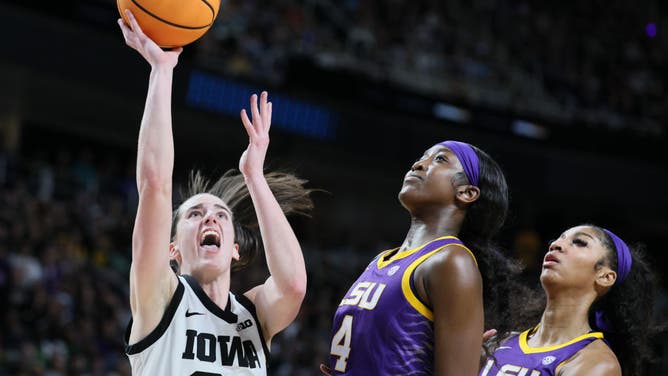
Caitlin Clark continually shredded LSU's defense inside for easy layups, like this one, on Monday night to lead Iowa to a 94-87 win over LSU to reach the FInal Four. (Getty Images)
"I thought Kim Mulkey made a critical mistake with no double teams or zone against Clark," a former prominent men's college basketball coach told OutKick Tuesday. "She made a strategic mistake by letting Caitlin play her game and trying to hold the other players down. You have to cut off the snake at the head. But not once did they ever double-team her. Not once off a ball screen, did they just jam her up and make her give up the ball."
That did work last year for Mulkey as LSU beat Iowa, 102-85, for the national championship with Clark scoring 30. But this is this year.
Caitlin Clark's Dribble Penetration Was The Difference
And Clark scored 40 points or more for the 13th time in her career with 41 on 13-of-29 shooting, including 9 of 20 from 3-point range. But here are the key statistics of the night. Clark always shoots from deep outside the 3-point line. That was not new. In this game, there was something a bit different because of LSU's poor single coverage. Clark constantly drove inside effectively, often barely or not contested, as she easily blew by slower LSU players like point guard Hailey Van Lith, Angel Reese and just about anyone else Mulkey tried on her as the game wore on.
As a result, Clark took nine layups or near layups and made four of them. When LSU covered better, Clark drew fouls usually inside. She drew more fouls than anyone in the game other than Reese, who is a forward and tends to stay inside. Clark hit 6 of 7 free throws. So, there are 14 points right there that materialized from well inside the 3-point line and her patented logo 3. And she produced a game-high 12 assists as most of those dishes came from short range after she penetrated. And she turned it over just five times as the lane against LSU tended to be the path of least resistance.
The clearest sign of a bad defense is a guard dribbling virtually untouched to the goal, and Clark did it over and over against Mulkey's team like few other Iowa opponents.
"Our goal coming into this game was to set a ton of ball screens," Clark said. "And that's exactly what we did. I thought I got some good looks off the dribble, and I'm really comfortable shooting off the dribble. That's what I prefer rather than catch and shoot."
And LSU's lack of defense played right into her hands and shots.
"LSU never stopped Clark's dribble penetration," our coach said. "I would've double-teamed her off every ball screen, because they set a ton of ball screens for her. I would've made her give up the ball. Her teammates scored because of the way she was playing."
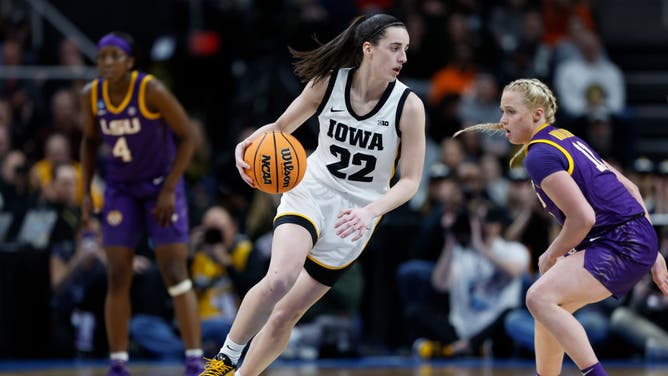
Caitlin Clark blows by LSU guard Haily Van Lith in Monday night's game. (Getty Images)
Iowa (33-4) plays No. 3 seed Connecticut (33-5) in a national semifinal in Cleveland on Friday (9:30 p.m., ESPN). The winner advances to the national championship game on Sunday (3 p.m., ABC) against the winner of No. 1 seed South Carolina (36-0) and No. 3 seed North Carolina State (31-6), which play the first game Friday (7 p.m., ESPN).
And if UConn coach Geno Auriemma tries to play woman-to-woman defense against Clark, I'm going to go ahead and say it. This game is fixed.
"I just got one question," former Virginia Tech coach Seth Greenberg said on ESPN's College GameDay on Feb. 17 after Clark scored 49 two nights before to beat Michigan.
Questioning The Defenses Vs. Caitlin Clark Not New
"Will someone please just trap her every time she catches the ball? Because you can't just let her drop like 44 every single night like the Pistol (Pete Maravich) did," Greenberg said brilliantly.
And few have tried! Is it against the rules? I know the women's basketball is smaller than the ones used in the men's game. But you can play zone, right? Or maybe a box-and-1, which is one player on Clark with the other four in zone. Or maybe double teams here and there, as our coach said.
Former Tennessee player Andraya Carter asked the same question to coaches she knows before that show, and she said she was told, "We trapped her. She got the ball out of the trap, passed off, made a cut to the basket and scored a layup. You can't. You can't."
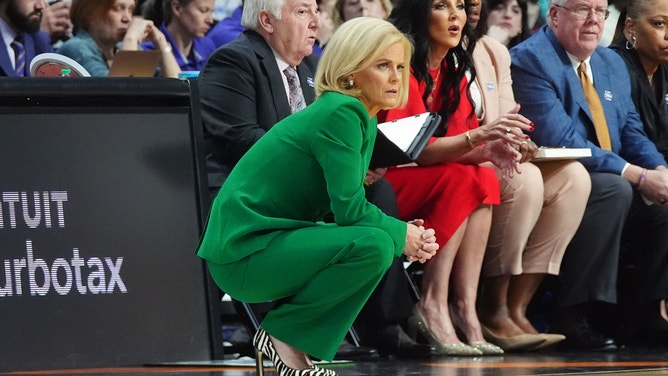
LSU coach Kim Mulkey's woman-to-woman defense against Caitlin Clark did not work as well in the rematch as did the first time. (Getty Images).
Well, I thought Mulkey would've at least tried to cook up something for Clark. When Mulkey's not roasting media members and news outlets like so many marshmallows, she can game plan with the best of them - just like her coach and mentor Leon Barmore. She played and coached under him at Louisiana Tech from 1980-2000 and learned the art of man-to-man defense.
"No, I'm not a zone coach, but I dang sure like to win," Mulkey said on April 3, 2005, after she reached her first national championship as a head coach when Baylor beat LSU, 68-57, in Indianapolis. LSU led 24-9 in the first half against her woman-to-woman defense, and she switched to a 2-2-1 zone with some 3-2 zone.
And Baylor with one All-American, 6-foot-1 forward Sophia Young, destroyed LSU coach Pokey Chatman and her three All-Americans - Naismith, Wooden and Wade Award winner Seimone Augustus, point guard Temeka Johnson and 6-6 center Sylvia Fowles.
"We just beat, in my opinion, the most talented team in the country with the best player in the country (Augustus)," Mulkey said, and she was right on. Because she got out of man defense.
That's what I was expecting Monday night from Mulkey.
Kim Mulkey Does Not Like Zone, And Man Worked Last Year Vs. Clark
But, she beat Iowa and Clark last year with her patented man-to-man defense, so why change? Makes sense.
In truth, though, she beat Iowa last year more because of her offense that night in Dallas. The 102 points broke the record set in 1986 by USC for most points in a women's championship game. And Iowa and Clark never threatened after falling behind by 27-22 in the first quarter and by 59-42 at the half.
LSU did not stop Clark last year, either, and won, which may have made Mulkey stick with the same plan. Clark scored 30 with eight 3-pointers on 19 attempts. But she had only eight assists and was just 1 of 3 from inside the arc. She did not penetrate as she did Monday.
"So much for preaching defense and rebounding," Mulkey laughed last year after winning her first LSU national title with offense after three at Baylor. LSU finished fifth in scoring last year with 82 points a game. It was 35th in scoring defense.
LSU came into Monday's night's game No. 2 in the nation in scoring with 85 points a game, just behind Iowa's 91. So, again, it made sense on paper for Mulkey on Monday night to play man-to-man defense.
"We didn't even guard her last year when we beat them," Mulkey said after losing Monday night. "There's not a lot of strategy. You've got to guard her. Nobody else seems to be able to guard her."
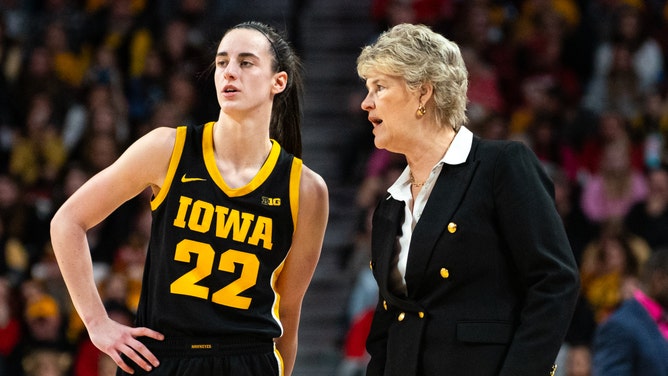
Iowa coach Lisa Bluder started fast against LSU, which surprised coach Kim Mulkey, and she directed Caitlin Clark to penetrate more early and stay away from the "logo three." That worked, too. (Dylan Widger-USA TODAY Sports)
Precisely why Mulkey should have considered something different, particularly with Clark better this year than last year. She is scoring five more points a game this season, and her assists are up. Plus, the best coaches often switch strategies, even though they previously worked, because the opponent is expecting the same thing.
And Iowa coach Lisa Bluder decided to start faster this time around as LSU's guards are not as quick as Clark and Iowa's other guards. That worked. Iowa took a 15-6 lead in the opening minutes. LSU came back and took a 31-26 lead to end the first quarter, but Clark's drives couldn't be stopped, and the tone was set. And it surprised Mulkey.
"Yes," she said. "We played to their pace, and ended the first quarter with the lead. But their pace dictated that third quarter."
This was partly because Reese aggravated a previous ankle injury in the second quarter. This should've been another reason for a different defense by Mulkey. Reese recovered well and came back strong to finish heroically with 17 points, an incredible 20 rebounds, along with four assists, three blocks and two steals. But in the second half, she couldn't stay up with Iowa's fast break offense, because of the ankle. Neither could her teammates. This was obvious as the game wore on.
Yes, LSU was tied at 45 at the half despite Clark scoring 19. But Mulkey should have considered a change because Bluder's plan was working perfectly - all that dribble penetration. Clark hit 4 of 5 shots from close range in the first half along with five assists. And no one could stop her.
"I was really happy she got to the rim quite a bit and got off ball screens," she said. "We encouraged her to do that because we didn't want her to start out with the logo threes. We thought she could get to the rim, and we wanted the higher-percentage shots to begin with."
Clark penetrated LSU's slow, single coverage so well, Bluder wanted to stick with that in the third quarter.
Caitlin Clark Had ‘A Different Look In Her Eye’ In 2nd Half
"But she came out with a different look in her eye," Bluder said. "I could tell it wasn't going to happen."
And she let her superstar go. Clark came out firing from around 30 feet to open the third quarter. She hit 4 of 7 shots from 3-point range to give her 31 for the game and a commanding, 69-58 lead entering the fourth quarter.
It was over. LSU trailed by double digits most of the final period.
"I think it really hit us in the third quarter - that pace," Mulkey said.
Then Mulkey did something smart that, in hindsight, she should have done earlier. She put her best perimeter defender on Clark - guard Flau'jae Johnson. And that was the only move by Mulkey against Clark that worked. But it was too little and too late.
"Yeah," Clark said when asked if she was surprised that Johnson had not been on her more. "Coming into this game, I did expect her to guard me. I will say that. But also, you don't want some of your best players to get in foul trouble."
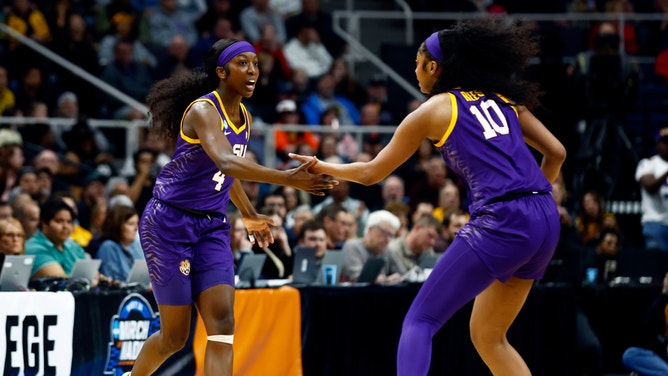
LSU guard Flau'jae Johnson (left) was the only defender who made a dent in Caitlin Clark's game Monday night, but it was too little too late. (Winslow Townson-USA TODAY Sports)
That's just it. Johnson had only one foul at the half and two entering the fourth quarter. She could've been on Clark more. She is one of LSU's best scorers and had 23 points, but she could have possibly made a difference with more time on Clark, particularly with a little zone or a box-and-one.
"I mean, we studied her film," Johnson said. "I'm aggressive."
And faster than the other LSU players who tried to guard Clark.
"I just wasn't scared," Johnson said. "When you play a player like that, you've got to look them in the eye and really take on that challenge."
It's easy to criticize Mulkey in hindsight. And it is hard to criticize Mulkey for using the same strategy that did work a year ago. And it could've worked again, had Reese not been slowed by the ankle injury. Reese could've helped more on defense and scored more. That could've been the difference. But she also missed five of eight from the line. We'll never know.
RELATED: Kim Mulkey Happy Caitlin Clark Is Leaving
"She's just a generational player," Mulkey said, as if to throw up her hands. "And she just makes everybody around her better. That's what the great ones do."
But Mulkey is a great one, too, yet in some ways, she facilitated Clark making "everybody around her better," by not trying more than one defender on her at least some of the time, or by trying some kind of gimmick defense. Something. Anything.
Because you, Kim Mulkey, are a generational coach. And I thought I'd see more of that.